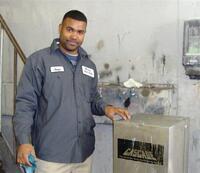Moreno Auto Body and the Boston Public Health Commission
Facility Leadership Tour
N E W S R E L E A S E
March 23, 2010
Moreno Auto Body Recognized for Environmental Leadership by TURA Program
Boston Shop Eliminates Use of Hazardous Chemicals, Protects Workers, Neighborhood
LOWELL, Mass. – Moreno Auto Body in Roxbury will be honored as an environmental small business leader for replacing toxic chemicals with safer alternatives. The ceremony and tour will take place at the shop on Thursday, March 25 at 30 Blue Hill Avenue in Roxbury.
This small business is one of 17 Massachusetts companies being recognized by legislators and representatives of the Toxics Use Reduction Act (TURA) Program as a “TURA 20th Anniversary Leader.” The awards and tours are intended to showcase environmental accomplishments—use of safer materials, waste reductions and energy savings—since the Toxics Use Reduction Act was enacted by the Massachusetts legislature in 1989.
“We selected Moreno Auto Body as a leader for reducing worker exposure to toxic chemicals and for sharing their experience with employees from five other shops in the Boston area,” said Joy Onasch, community program manager of the Toxics Use Reduction Institute at UMass Lowell. “This small business is a great model of how reducing toxics can be achieved by any sized company or community organization to protect workers, our neighborhoods and the environment.”
The shop’s owner, Juan Chavez, has replaced toxic spray gun washing chemicals — toluene and acetone that are known to cause damage to the central nervous system — with a more effective and less expensive water-based system.
“By switching to safer products, it’s better for the health of both my clients and workers,” said Chavez. “Our air quality has improved and I’m also saving money by using less solvent to wash the paint guns.”
Before and after indoor air quality monitoring, conducted by UMass Lowell’s Work Environment Department, showed substantial reductions — a 94 percent decrease in the presence of acetone and an 88 percent decrease in the presence of toluene in the air.
The Toxics Use Reduction Institute, one of three state agencies that implements TURA, awarded the Boston Public Health Commission a community grant in 2007 for its Safe Shops Project to focus on toxics use reduction in auto repair and body shops by conducting trainings and purchasing safer products. During this specialized training, participants learned proper paint gun pollution prevention techniques and tested alternative chemicals, hardware and personal protective equipment. It was this training that inspired Moreno Auto Body, and another shop in Mattapan, to make significant environmental improvements.
“Exposure to some of the chemicals used in these shops can have a devastating impact on workers’ health,” states Tolle Graham of the Massachusetts Coalition for Occupational Safety and Health, a partner in the Safe Shops Project. “We need more employers to step up as these shops did and substitute their toxic chemicals with safer ones. We also need to expand opportunities for toxics use reduction, which not only protects workers but also saves substantial hazardous waste disposal costs.”
A bout the Boston Public Health Commission’s Safe Shops Project
Since 2005, The Boston Public Health Commission’s Safe Shops Project has partnered with auto repair and body shops, community groups, health centers, and city agencies to address health disparities in communities that are overburdened with toxic chemical exposure. More than 714 auto shop workers from 139 auto shops have participated in Safe Shops training. By providing environmental and workplace safety trainings, health screenings, and financial and technical assistance at no cost, the Safe Shops Project helps small businesses succeed while creating a safer environment for their workers and neighbors.
About the Toxics Use Reduction Act Program
Twenty years ago, the Massachusetts legislature passed landmark legislation—the Toxics Use Reduction Act (TURA). Today, the TURA Program is considered a model environmental policy by other states and countries. The three agencies below have provided training, grants, technical assistance and support to help companies reduce toxic chemical use and costs, improve health and safety and establish new green markets.
• Toxics Use Reduction Institute (TURI) at the University of Massachusetts Lowell. Provides education, training, and grants for Massachusetts industry and communities; sponsors research and demonstration sites on safer materials and technologies; provides policy analysis; and manages the TURA Science Advisory Board.
• Office of Technical Assistance & Technology (OTA). A non-regulatory agency within the Executive Office of Energy and Environmental Affairs that provides free, confidential, on-site technical and compliance consultations to Massachusetts businesses and institutions.
• Massachusetts Department of Environmental Protection (MassDEP). Certifies Toxics Use Reduction (TUR) Planners, receives and reviews toxics use reports submitted by companies, provides guidance, takes enforcement actions, and collects chemical use data and makes it available to the public
